Index relies entirely on the support of donors and readers to do its work.
Help us keep amplifying censored voices today.
International Women’s Day is a day to remember violence against women, the education gap, the wage gap, online harassment, everyday sexism, the intersection between sexism and other -isms, and a whole host of other issues to make us realise we’ve still got a long way to go. A day to demand continued progress, and a day to pledge to work to achieve it.
But it is also a day to celebrate. To appreciate the fantastic achievements that are made every day, everywhere, by women from all walks of life. It’s a day to be grateful to the women who dedicate their lives to fighting on the front lines to protect rights vital to us all. We want to shine the spotlight on women who have stood up for freedom of expression when it’s not the easy or popular thing to do, against fierce opposition and often at great personal risk. The following eight women have done just that. We know there are many, many more. Tell us about your female free speech hero in the comments or tweet us @IndexCensorship.
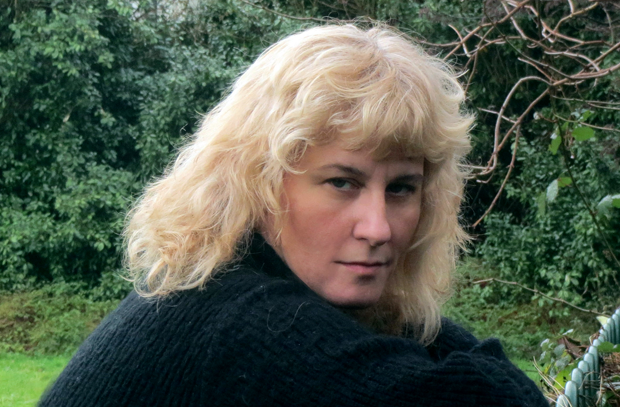
Meltem Arikan
Arikan is a writer who has long used her work to challenge patriarchal structures in society. He latest play “Mi Minor” was staged in Istanbul from December 2012 to April 2013, and told the story of a pianist who used social media to challenge the regime. Only a few months after, the Gezi Park protests broke out in Turkey. What started as an environmental demonstration quickly turned into a platform for the public to express their general dissatisfaction with the authorities — and social media played a huge role. Arikan was one of many to join in the Gezi Park movement, and has written a powerful personal account of her experiences. But a prominent name in Turkey, she was accused of being an organiser behind the protests, and faced a torrent of online abuse from government supporters. She was forced to flee, now living in exile in the UK.
I realised that we were surrounded, imprisoned in our own home and prevented from expressing ourselves freely.

Anabel Hernández (Image: YouTube)
Hernández is a Mexican journalist known for her investigative reporting on the links between the country’s notorious drug cartels, government officials and the police. Following the publication of her book Los Señores del Narco (Narcoland), she received so many death threats that she was assigned round-the-clock protection. She can tell of opening the door to her home only to find a decapitated animal in front of her. Before Christmas, armed men arrived in her neighbourhood, disabled the security cameras and went to several houses looking for her. She was not at home, but one of her bodyguards was attacked and it was made clear that the visit — from people first identifying themselves as members of the police, then as Zetas — was because of her writing.
Many of these murders of my colleagues have been hidden away, surrounded by silence – they received a threat, and told no one; no one knew what was happening…We have to make these threats public. We have to challenge the authorities to protect our press by making every threat public – so they have no excuse.
Amira Osman, a Sudanese engineer and women’s rights activist was last year arrested under the country’s draconian public order act, for refusing to pull up her headscarf. She was tried for “indecent conduct” under Article 152 of the Sudanese penal code, an offence potentially punishable by flogging. Osman used her case raise awareness around the problems of the public order law. She recorded a powerful video, calling on people to join her at the courthouse, and “put the Public Order Law on trial”. Her legal team has challenged the constitutionality of the law, and the trial as been postponed for the time being.
This case is not my own, it is a cause of all the Sudanese people who are being humiliated in their country, and their sisters, mothers, daughters, and colleagues are being flogged.
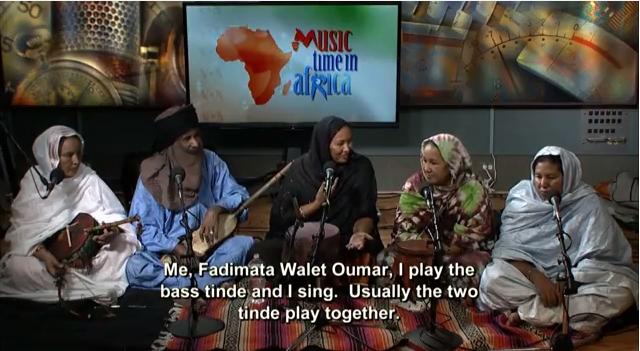
Fadiamata Walet Oumar with her band Tartit (Image: YouTube)
Fadiamata Walet Oumar is a Tuareg musician from Mali. She is the lead singer and founder of Tartit, the most famous band in the world performing traditional Tuareg music. The group work to preserve a culture threatened by the conflict and instability in northern Mali. Ansar Dine, an islamists rebel group, has imposed one of the most extreme interpretations of sharia law in the areas they control, including a music ban. Oumar believes this is because news and information is being disseminated through music. She fled to a refugee camp in Burkina Faso, where she has continued performing — taking care to hide her identity, so family in Mali would not be targeted over it. She also works with an organisation promoting women’s rights.
Music plays an important role in the life of Tuareg women. Our music gives women liberty…Freedom of expression is the most important thing in the world, and music is a part of freedom. If we don’t have freedom of expression, how can you genuinely have music?

Khadija Ismayilova
Ismayilova is an award-winning Azerbaijani journalist, working with Radio Free Europe/Radio Liberty. She is know for her investigative reporting on corruption connected to the country’s president Ilham Aliyev. Azerbaijan has a notoriously poor record on human rights, including press freedom, and Ismayilova has been repeatedly targeted over her work. She was blackmailed with images of an intimate nature of her and her boyfriend, with the message to stop “behaving improperly”. This February, she was taken in for questioning by the general prosecutor several times, accused of handing over state secrets because she had met with visitors from the US Senate. In light of this, she posted a powerful message on her Facebook profile, pleading for international support in the event of he arrest.
WHEN MY CASE IS CONCERNED, if you can, please support by standing for freedom of speech and freedom of privacy in this country as loudly as possible. Otherwise, I rather prefer you not to act at all.
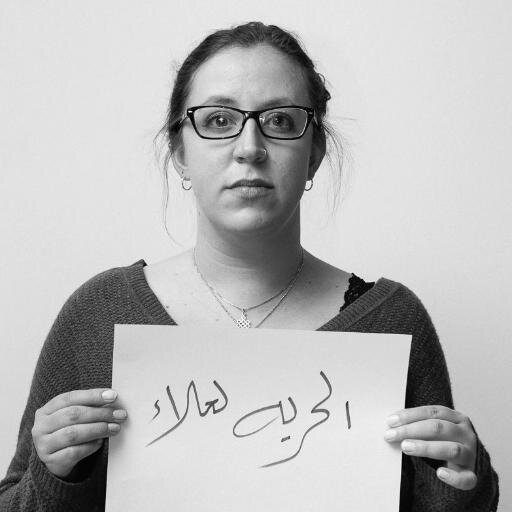
Jillian York (Image: Jillian C. York/Twitter)
Jillian York is a writer and activist, and Director of Freedom of Expression at the Electronic Frontier Foundation (EFF). She is a passionate advocate of freedom of expression in the digital age, and has spoken and written extensively on the topic. She is also a fierce critic of the mass surveillance undertaken by the NSA and other governments and government agencies. The EFF was one of the early organisers of The Day We Fight Back, a recent world-wide online campaign calling for new laws to curtail mass surveillance.
Dissent is an essential element to a free society and mass surveillance without due process — whether undertaken by the government of Bahrain, Russia, the US, or anywhere in between — threatens to stifle and smother that dissent, leaving in its wake a populace cowed by fear.
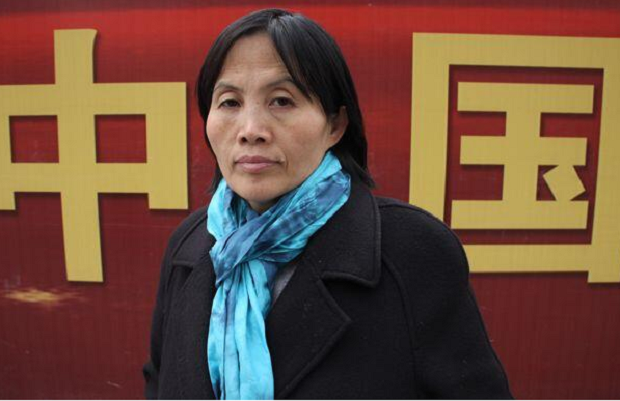
Cao Shunli (Image: Pablo M. Díez/Twitter)
Shunli is an human rights activist who has long campaigned for the right to increased citizens input into China’s Universal Periodic Review — the UN review of a country’s human rights record — and other human rights reports. Among other things, she took part in a two-month sit-in outside the Foreign Ministry. She has been targeted by authorities on a number of occasions over her activism, including being sent to a labour camp on at least two occasions. In September, she went missing after authorities stopped her from attending a human rights conference in Geneva. Only in October was she formally arrested, and charged for “picking quarrels and promoting troubles”. She has been detained ever since. The latest news is that she is seriously ill, and being denied medical treatment.
The SHRAP [State Human Rights Action Plan, released in 2012] hasn’t reached the UN standard to include vulnerable groups. The SHRAP also has avoided sensitive issue of human rights in China. It is actually to support the suppression of petitions, and to encourage corruption.
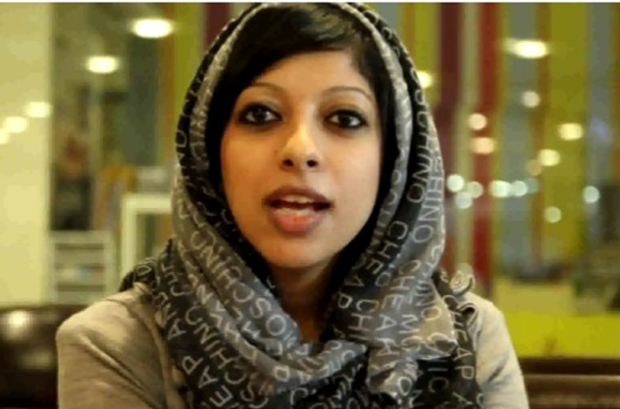
Zainab Al Khawaja
Al Khawaja is a Bahraini human rights activist, who is one of the leading figures in the Gulf kingdom’s ongoing pro-democracy movement. She has brought international attention to human rights abuses and repression by the ruling royal family, among other things, through her Twitter account. She has also taken part in a number of protests, once being shot at close range with tear gas. Al Khawaja has been detained several times over the last few years, over “crimes” like allegedly tearing up a photo of King Hamad bin Isa Al Khalifa. She had been in jail for nearly a year when she was released in February, but she still faces trials over charges like “insulting a police officer”. She is the daughter of prominent human rights defender Abdulhadi Al Khawaja, who is currently serving a life sentence.
Being a political prisoner in Bahrain, I try to find a way to fight from within the fortress of the enemy, as Mandela describes it. Not long after I was placed in a cell with fourteen people—two of whom are convicted murderers—I was handed the orange prison uniform. I knew I could not wear the uniform without having to swallow a little of my dignity. Refusing to wear the convicts’ clothes because I have not committed a crime, that was my small version of civil disobedience.
This article was posted on March 8, 2014 at indexoncensorship.org
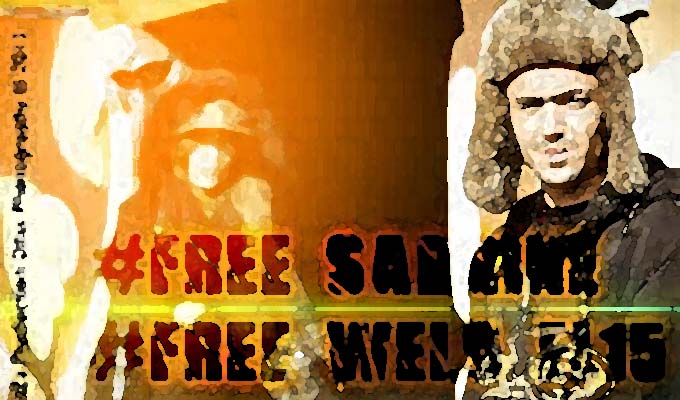
Art is one of the most prominent forms of freedom of expression, allowing people to express their thoughts through song, dance, prose and theatre. It is not uncommon across the world for performers to be attacked as a form of censorship, ultimately silencing what they are trying to say.
Ala Yaacoub- Tunisian rapper, two years imprisonment
Tunisian rapper Weld El 15, real name Ala Yaacoub, was sentenced to two years in prison after posting a song online in which he insulted and threatened police.
Yaacoub, 25, told AFP that in the rap, entitled The Police are Dogs, he used the same terms that the police use to speak about the youth: “The police have to respect citizens if they want to be respected. I am afraid because in a country like Tunisia the law is not applied; you can expect anything.”
Some of those involved in the production of the music video for the rap, including director Mohamed Hedi Belgueyed and actress Sabrine Klibi, were handed suspended sentences of six months. Yaacoub was freed a month after his trial and given a suspended six-month term.
Tunisia was the first country to be hit by the ‘Arab Spring’ after which a moderate Islamist-led government was elected after the overthrow of Zine al-Abidine Ben Ali. Since then there has been an increase in ultra-conservative Islamists, Salafists, who have been campaigning for greater public piety in Tunisia.
Aron Atabek – Kazakh poet, 18 years imprisonment
In 2007 Aron Atabek was sentenced to 18 years imprisonment following his involvement in a 2006 protest against an attempt by Kazakh authorities to flatten a shanty town; the protest ended in violent clashes and the death of a police officer.
Whilst in jail Atabek wrote poetry and prose relating to the clash which was later smuggled out of his prison and posted online. The authorities, not happy with this, sentenced Atabek to two years in solitary confinement, serving one year until November 2013. This type of punishment, in which he was watched under 24 hour video surveillance, was nothing new to the poet having spent two years in solitary confinement previously for refusing to wear a prison uniform.
Since leaving solitary confinement and returning to his previous prison Atabek’s family are still yet to have any contact with him.
Malian musicians- 12,000 singers and musicians banned from working
Islamic militants first announced a ban on music in the north of Mail in 2012; since then the ban has spread to nearly two-thirds of the country, a country from which artists such as Ali Farka Touré, Rokia Traoré and Salif Keita have witnessed global success.
After armed militants sent out death threats nearly 12,000 musicians found themselves out of work, with some facing exile, as instruments were destroyed and live venues shut down. The 2013 Festival in the Desert, a world famous Malian music event, was moved to neighbouring Burkina Faso and then later postponed due to security risks.
Fadimata “Disco” Walet Oumar was forced to flee as the conflict in Mali developed: “Life without music is not possible … I would rather die than never be able to perform, create or listen to music again in my life.”
The state of emergency has been lifted in the country and the Islamists driven out of the north of the country by the help of the French. But refugees returning to the country don’t yet believe that Mali’s problems are over.
Tunisian actors
Nineteen actors in the Tunisian city of El Kef were attacked by Salafist Muslims only to be arrested themselves by police under claims of ‘indecency’.
Whilst performing at a small theatre, to help raise funds for another venue that had been burnt down in an arson attack, the group of actors were attacked by the militant group. The performance, entitled “Guetlouh” (They Killed Him), was a tribute to opposition politician Chokri Belaid, who was assassinated in February by suspected Salafists.
The charge for indecent behaviour carries a sentence of up to six months imprisonment in Tunisia.
Lena Hendry
‘No Fire Zone: The Killing Fields of Sri Lanka’ was shown on Channel 4 in 2012, drawing in more than double the viewers of a 11pm broadcast despite the graphic content it showed. The ITN team behind the documentary went on to be nominated for a Nobel Peace Prize.
Lena Hendry, on the other hand faces jail for organising a private screening of the documentary during a human rights event in Kuala Lumpur, Malaysia.
Hendry was charged on 19 September for her involvement in the screening of the documentary on 9 July 2013 under the Film Censorship Act 2002, in connection with the screening of a video which was not vetted and approved by the Film Censorship Board of Malaysia. If convicted she faces a fine of between $1,576 and $9,455, up to three years in jail or both.
The Magistrates’ Court scheduled a final procedural hearing for 17 March 2014, and set the trial dates for 31 March to 4 April 2014. Lena Hendry is bringing a High Court appeal challenging the charges.
INDEX EVENTS
18 July New World (Dis)Order: What do Turkey, Russia and Brazil tell us about freedom and rights?
Index, in partnership with the European Council on Foreign Relations, is holding a timely debate on the shifting world order and its impact on rights and freedoms. The event will also launch the latest issue of Index on Censorship magazine, including a special report on the multipolar world.
(More information)
19 July: What surveillance means to YOU
Join us 19 July for a live Google hangout with Index on Censorship as Trevor Timm of the Electronic Frontier Foundation and Rebecca Mckinnon of Gloval Voices discuss what mass surveillance means to all of us as individuals. Hosted by Padraig Reidy of Index, the hour-long event will delve in the issues around government surveillance of innocent civilians.
(More information)
BURKINA FASO
Burkina Faso state media journalists protest censorship
In Burkina Faso, tens of journalists from state media today held a sit-in in front of the Ministry of Communications in the capital Ouagadougou to protest what they deem to be excessive government censorship of news coverage.
(CPJ Blog)
CHINA
Censorship in China is Deeper and More Insidious Than You Think
Despite a free-wheeling micro-blogging scene, traditional media sources still operate under heavy government constraints.
(The Atlantic)
JAPAN
Former premier sues Shinzo Abe for libel over Fukushima disaster
Prime minister says Kan’s instructions to dampen nuclear emergency were ‘made up’
(South China Morning Post)
LIBYA
Libya moves a step closer to new post-Gaddafi constitution
Libya’s national assembly passed a law on Tuesday providing for the election of a committee to draft a new constitution following the overthrow of dictator Muammar Gaddafi in 2011.
(Reuters)
RUSSIA
Russian senator officially demands ‘measures’ against ‘flagrant’, ‘privacy-breaching’ Google
A high-profile Russian lawmaker has lodged an official request with the general prosecutor to investigate Google’s activities in Russia, saying the web services company’s privacy policy “gravely violates the Russian constitution.”
(RT)
SRI LANKA
Sri Lankan film ban halts French festival, sparks anger
The Sri Lankan government’s decision to ban the acclaimed film, “Flying Fish” and halt the French film festival, where it was screened has sparked outrage in a country that’s no stranger to threats to free speech.
(France 24)
TURKEY
Turkey regulator to appoint two board members to Turkcell
Turkey’s Capital Markets Board will appoint two board members to Turkcell Iletisim Hizmetleri AS soon, Chairman Vahdettin Ertas told Turkish TV channel CNBCe Tuesday, after a series of failed annual shareholder meetings amid the long-running dispute over control of Turkcell.
(Total Telecom)
UNITED STATES
Emails show ex-Gov. Daniels sought to quash political opposition in Ind. schools
Former Indiana Gov. Mitch Daniels pledged to promote academic freedom, not stifle it, when he became president at Purdue University in January.
(AP via Daily Reporter)
Advice column is free speech; Ky. psychology board overreaches
What do the Westboro Baptist Church, Larry Flynt and John Rosemond have in common? All have turned to federal courts to protect their First Amendment rights. Westboro and Flynt prevailed at the Supreme Court which ruled that, no matter how noxious or crude, protests at military funerals and Hustler satire are constitutionally protected forms of expression.
(Lexington Herald-Leader)
Terror Supporter May Have Free Speech Case
A man convicted of aiding al-Qaida can pursue claims that Uncle Sam has cut off his speech in prison, but he’ll face a heavy burden of proof, a federal judge ruled.
(Courthouse News)
‘Veterans’ Free Speech Trial Ends in Guilty Verdict, Followed by Dismissal of Charges
Judge Robert Mandelbaum covered all his bases with his verdict July 12 in the case of 12veterans and their allies arrested last Oct. 7 at New York City’s Vietnam Veterans Memorial Plaza.
(The Indypendent)
‘US citizen has no right to free speech?’ State Dept spokesperson
During a daily press briefing State Department spokeswoman, Jen Psaki was given a thorough grilling on the Snowden affair by journalists, including AP’s Matthew Lee and CNN’s Elise Labott and was left lost for words at almost every turn.
(RT)
Previous Free Expression in the News posts
July 16 | July 15 | July 12 | July 11 | July 10 | July 9 | July 8 | July 5 | July 4 | July 3